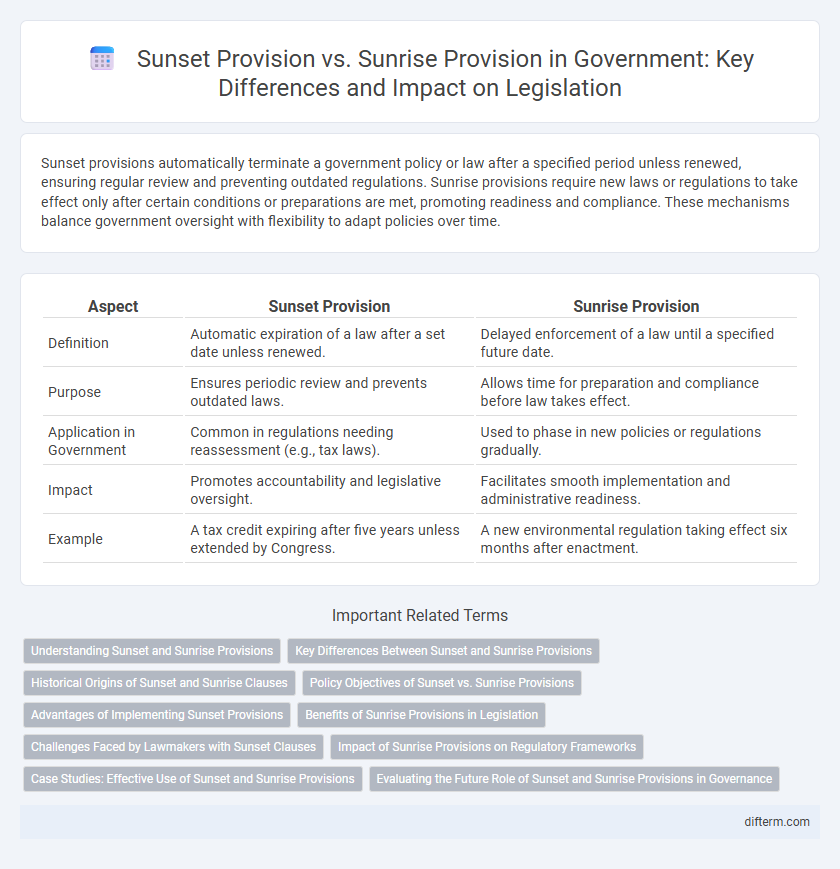Sunset provisions automatically terminate a government policy or law after a specified period unless renewed, ensuring regular review and preventing outdated regulations. Sunrise provisions require new laws or regulations to take effect only after certain conditions or preparations are met, promoting readiness and compliance. These mechanisms balance government oversight with flexibility to adapt policies over time.
Table of Comparison
| Aspect | Sunset Provision | Sunrise Provision |
|---|---|---|
| Definition | Automatic expiration of a law after a set date unless renewed. | Delayed enforcement of a law until a specified future date. |
| Purpose | Ensures periodic review and prevents outdated laws. | Allows time for preparation and compliance before law takes effect. |
| Application in Government | Common in regulations needing reassessment (e.g., tax laws). | Used to phase in new policies or regulations gradually. |
| Impact | Promotes accountability and legislative oversight. | Facilitates smooth implementation and administrative readiness. |
| Example | A tax credit expiring after five years unless extended by Congress. | A new environmental regulation taking effect six months after enactment. |
Understanding Sunset and Sunrise Provisions
Sunset provisions are legislative clauses that automatically terminate a law or regulation after a specific date unless further action is taken to extend it, ensuring periodic review and accountability in government policies. Sunrise provisions, by contrast, require prior approval or additional steps before a new law or regulation can take effect, allowing for oversight and evaluation before implementation. Understanding these mechanisms helps governments balance innovation with control, preventing outdated laws from persisting while ensuring new policies are thoroughly vetted.
Key Differences Between Sunset and Sunrise Provisions
Sunset provisions mandate the automatic expiration of a law or regulation after a specific period unless renewed, ensuring periodic review and preventing outdated policies. Sunrise provisions require pre-implementation studies or conditions to be met before a law or regulation takes effect, promoting informed decision-making and readiness. These mechanisms differ in timing and purpose: sunset provisions focus on ending policies unless extended, while sunrise provisions emphasize preparedness before enforcement.
Historical Origins of Sunset and Sunrise Clauses
Sunset provisions trace their origins to early English common law, designed to ensure laws expired after a certain period unless renewed, preventing outdated regulations from persisting. Sunrise provisions emerged more recently, particularly during the 20th century, to introduce new regulations triggered by specific future events or conditions, allowing governments to respond proactively to changing circumstances. Both clauses serve as legislative mechanisms to balance adaptability and accountability in government policy-making.
Policy Objectives of Sunset vs. Sunrise Provisions
Sunset provisions in government policies are designed to ensure periodic review and prevent outdated or ineffective regulations by setting expiration dates, thereby promoting accountability and adaptability. Sunrise provisions, on the other hand, establish requirements for pre-implementation assessments and stakeholder consultations to proactively address potential impacts and ensure readiness before policies take effect. Both mechanisms aim to optimize regulatory efficiency, with sunset provisions focusing on policy termination and sunrise provisions emphasizing informed commencement.
Advantages of Implementing Sunset Provisions
Sunset provisions offer governments a strategic mechanism to periodically review and evaluate legislation, ensuring outdated or ineffective laws are repealed to maintain regulatory efficiency. They promote accountability by requiring lawmakers to justify the continuation of statutes based on current societal needs and data-driven outcomes. Implementing sunset provisions reduces bureaucratic inertia and prevents the perpetuation of obsolete policies, enhancing adaptive governance.
Benefits of Sunrise Provisions in Legislation
Sunrise provisions in legislation provide a structured framework for gradual implementation, allowing governments to assess effectiveness and make necessary adjustments before full enforcement. This phased approach minimizes risks, enhances compliance, and ensures public agencies are adequately prepared for new regulations. By facilitating smoother transitions, sunrise provisions promote transparency and accountability in the legislative process.
Challenges Faced by Lawmakers with Sunset Clauses
Sunset provisions pose significant challenges for lawmakers due to their inherent time limits, which require continuous review and reauthorization of laws to ensure relevance and efficacy. This periodic assessment demands substantial legislative resources and can create uncertainty for stakeholders relying on the stability of regulations. Unlike sunrise provisions, which introduce laws gradually, sunset clauses risk abrupt policy gaps if renewals are delayed or contested.
Impact of Sunrise Provisions on Regulatory Frameworks
Sunrise provisions introduce new regulations that come into effect at a future date, providing agencies time to prepare and ensuring smoother implementation within regulatory frameworks. They enable governments to anticipate changes in policy environments, allowing stakeholders to adapt processes and compliance strategies proactively. The impact of sunrise provisions on regulatory frameworks includes enhanced flexibility, improved resource allocation, and reduced risks of non-compliance during transitions.
Case Studies: Effective Use of Sunset and Sunrise Provisions
Case studies reveal that sunset provisions effectively ensure periodic legislative review, preventing outdated or ineffective laws from persisting, as seen in the USA's Authorization for Use of Military Force which requires renewal every two years to adapt to changing geopolitical landscapes. Sunrise provisions, exemplified by California's cannabis legalization law, enable future implementation contingent on meeting specific regulatory milestones, ensuring readiness and public safety before full enforcement. These mechanisms promote accountability and adaptability in governance by embedding conditional legislative lifespans and phased policy rollouts.
Evaluating the Future Role of Sunset and Sunrise Provisions in Governance
Sunset provisions ensure laws or regulations automatically expire after a set period, promoting accountability and preventing outdated policies from persisting. Sunrise provisions require agencies to conduct impact assessments before implementing regulations, encouraging proactive evaluation and transparency. Balancing sunset and sunrise provisions enhances adaptive governance by fostering continuous review and informed policy initiation.
Sunset Provision vs Sunrise Provision Infographic

 difterm.com
difterm.com